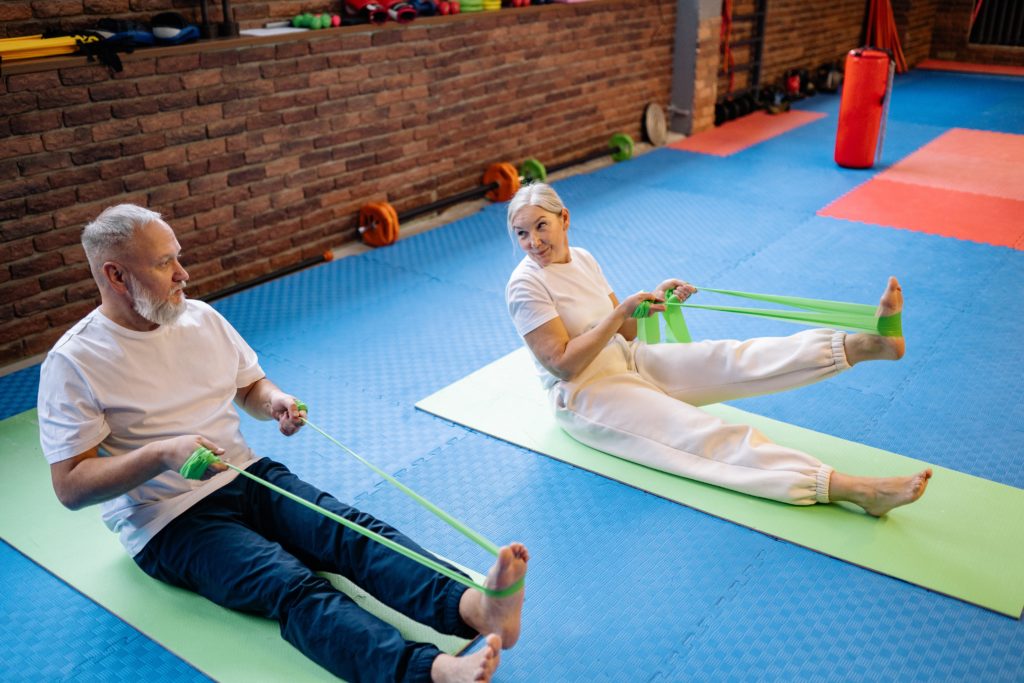
What is Resistance Training?
Resistance training, also known as strength training or weightlifting, is a form of exercise that involves the use of resistance or weights to build and strengthen muscles. It can include a variety of exercises, such as lifting weights, using resistance bands, or performing bodyweight exercises like push-ups or squats. The goal of resistance training is to progressively increase the resistance or weight used over time, which helps stimulate muscle growth and improve strength.
While many people associate resistance training with bodybuilding or sports performance, it is also a key tool for improving overall health and longevity.
A systematic review and meta-analysis published in May 2022 concluded that compared with undertaking no resistance training, undertaking any amount of resistance training reduced the risk of all-cause mortality by 15%, cardiovascular disease mortality by 19%, and cancer mortality by 14%.
In this article, we explore the benefits of resistance training for overall health and longevity.
Resistance training can help slow down the aging process and improve physical function and mobility in older adults.
The benefits of resistance training for aging
As we age, our bodies naturally undergo a series of changes that can lead to a decline in physical function and mobility. This process can be exacerbated by a sedentary lifestyle, which can further contribute to a decline in muscle mass, bone density, and overall physical health.
The problem with aging isn’t just the preservation of muscle, it’s the preservation of muscle, power, and strength – you want to stand up, catch yourself from a fall, pick things up from the floor – to be able to live an independent life. Resistance training is the number one way to combat neuromuscular aging.
Benefits of Resistance Training for Aging
Resistance training can help slow down the aging process and improve physical function and mobility in older adults.

The Benefits of Resistance Training for Aging:
- Increased Muscle Mass and Strength: As we age, we naturally lose muscle mass and strength. This can lead to a decline in physical function and mobility, making it harder to perform everyday activities. Resistance training can help counteract this process by stimulating muscle growth and improving muscle strength. Resistance training works by causing microscopic tears in the muscle fibres, which then repair and grow stronger during the recovery process. This process is known as muscle hypertrophy, and it leads to an increase in muscle size and strength. By gradually increasing the resistance or weight used in exercises, individuals can continue to challenge their muscles and promote further growth.
- Improved Bone Density: Bone density naturally declines with age, which can increase the risk of osteoporosis and fractures. Resistance training can help improve bone density by placing stress on the bones, which stimulates the growth of new bone tissue. This process is known as bone remodeling. Resistance training is particularly effective in improving bone density in the spine and hip, which are common sites of fractures in older adults. It can also help improve balance, which can further reduce the risk of falls and fractures.
- Enhanced Physical Function and Mobility: Resistance training can help improve physical function and mobility in older adults by increasing muscle strength and improving overall fitness. This can make it easier to perform everyday activities like getting up from a chair, walking, and climbing stairs. Resistance training can also improve balance and coordination, which can reduce the risk of falls and injuries. By improving physical function and mobility, resistance training can help older adults maintain their independence and improve their quality of life.
- Reduced the Risk of Chronic Disease: Regular resistance training has been shown to reduce the risk of chronic diseases like diabetes, heart disease, and certain types of cancer. It can also help improve blood pressure, cholesterol levels, and insulin sensitivity, all of which are risk factors for these conditions. Resistance training works by improving body composition, increasing muscle mass, and reducing body fat. It can also help improve overall fitness and cardiovascular health, which can further reduce the risk of chronic diseases.
- Improved Mental Health: Resistance training can help improve mental health and reduce symptoms of depression and anxiety in older adults. It can also help improve cognitive function and memory, which can reduce the risk of cognitive decline and dementia. Resistance training works by increasing the release of endorphins, which are natural chemicals in the brain that promote feelings of happiness and well-being. It can also help improve self-esteem and confidence, which can further enhance mental health.
The benefits of resistance training for chronic disease prevention and management

Resistance training has been shown to be an effective strategy for the prevention and management of several chronic diseases. Here is a list of benefits of resistance training for chronic disease prevention and management:
- Type 2 Diabetes: Resistance training can help improve insulin sensitivity, which is the body’s ability to use insulin to transport glucose (sugar) from the bloodstream to the cells where it can be used for energy. By building muscle and increasing overall physical activity, individuals with type 2 diabetes may be able to better manage their blood sugar levels and reduce their risk of complications associated with the disease.
- Cardiovascular Disease: Research has shown that regular exercise, including resistance training, can help improve cardiovascular health by reducing blood pressure, improving cholesterol levels, and reducing the risk of heart attack and stroke. By incorporating resistance training into their exercise routine, individuals with heart disease may be able to improve their overall health and reduce their risk of complications.
- Osteoporosis: Osteoporosis is a condition that causes bones to become weak and brittle, which can lead to fractures and other injuries. Resistance training can help build stronger bones by placing stress on the skeletal system, which prompts the body to create new bone tissue. This is especially important for older adults, who may be more at risk for developing osteoporosis, and postmenopausal women, who are at a higher risk of osteoporosis due to hormonal changes.
- Arthritis: Arthritis is a common condition that causes pain and inflammation in the joints. Resistance training can help improve joint flexibility and reduce pain associated with arthritis. By strengthening the muscles surrounding the joints, individuals with arthritis may be able to better support and protect the joints, improving their overall mobility and quality of life.
- Chronic Obstructive Pulmonary Disease (COPD): COPD is a chronic lung disease that makes it difficult to breathe. While many people with COPD may assume that exercise is not possible, resistance training has been shown to be safe and effective for individuals with the condition. By strengthening the respiratory muscles, individuals with COPD may be able to improve their breathing and reduce the risk of complications associated with the disease.
- Cancer: Resistance training can help reduce the risk of certain types of cancer, including breast and colon cancer. It can also help improve the quality of life for individuals undergoing cancer treatment by reducing fatigue and improving overall physical function.
The benefits of resistance training for weight management and body composition

Resistance training can be an effective tool for weight management and improving body composition. It works by increasing muscle mass and metabolic rate, reducing body fat, and improving overall fitness and health.
Some people may worry that resistance training will make them look bulky or overly muscular. However, it is important to note that building large muscles requires specific training techniques and nutritional strategies that are typically not used in general resistance training programs. Resistance training can help individuals achieve a leaner, more “toned” physique without the need for extreme training methods.
Here is a list of benefits of resistance training for weight management and body composition:
- Increased Muscle Mass: One of the main benefits of resistance training is increased muscle mass. By challenging the muscles with weights or resistance, the body responds by building and strengthening those muscles. This increase in muscle mass can lead to a higher metabolic rate, which means the body burns more calories at rest. In other words, the more muscle you have, the more calories your body will naturally burn throughout the day. This can be a powerful tool for weight management, as it can help individuals achieve a calorie deficit and lose weight more effectively.
- Reduced Body Fat: Resistance training can also help reduce body fat. While cardiovascular exercise is often recommended for weight loss, resistance training has been shown to be equally effective in reducing body fat. This is because resistance training helps build lean muscle tissue, which can improve overall body composition. When combined with a healthy diet, resistance training can lead to a reduction in body fat and an increase in lean muscle mass.
- Increased Resting Metabolic Rate: In addition to increasing muscle mass and reducing body fat, resistance training can also increase resting metabolic rate. This means that the body continues to burn calories even after the workout is over, leading to greater calorie burn throughout the day.
- Improved Insulin Sensitivity: Resistance training can help improve insulin sensitivity, which can aid in weight management. Improved insulin sensitivity means that the body is better able to use glucose for energy, which can reduce the risk of developing type 2 diabetes.
The benefits of resistance training for mental health

While it is often associated with physical health benefits, resistance training can also have significant benefits for mental health, including:
- Improved mood: Resistance training has been found to increase the release of endorphins, which are natural mood boosters. Endorphins are neurotransmitters that reduce pain and improve mood, and regular resistance training can increase their production. In addition, resistance training has been shown to decrease levels of the stress hormone cortisol, which can improve mood and reduce feelings of anxiety.
- Increased self-esteem: Regular resistance training can improve body image and self-esteem, particularly in individuals who are dissatisfied with their physical appearance. As individuals see improvements in their strength and physique, they may feel more confident and positive about their bodies. This can lead to a more positive outlook and improved mental health.
- Reduced symptoms of depression: Resistance training has been found to be effective in reducing symptoms of depression, including low mood, lack of energy, and loss of interest in activities. One theory is that resistance training improves mood by increasing the production of endorphins and other neurotransmitters that regulate mood. Another theory is that resistance training improves self-esteem, which can reduce feelings of depression.
- Reduced symptoms of anxiety: Resistance training can reduce symptoms of anxiety, including feelings of nervousness, tension, and worry. One study found that resistance training was effective in reducing anxiety symptoms in women with anxiety disorders. Regular resistance training can also improve overall stress management, which can reduce anxiety levels.
- Better sleep quality: Engaging in regular exercise, including resistance training, can improve sleep quality and reduce insomnia, leading to improved mental health. Studies have found that resistance training can help individuals fall asleep faster and stay asleep longer. Additionally, regular exercise has been found to improve the production of the sleep hormone melatonin, which can improve sleep quality.
- Improved cognitive function: Resistance training has been shown to improve cognitive function, including memory, attention, and processing speed, particularly in older adults. One theory is that resistance training improves cognitive function by increasing blood flow to the brain, which can improve the delivery of oxygen and nutrients to brain cells.
- Improved executive function: Resistance training has been found to improve executive function, which includes skills such as planning, decision-making, and impulse control. One theory is that resistance training improves executive function by increasing the production of brain-derived neurotrophic factor (BDNF), a protein that supports the growth and survival of brain cells.
- Reduced risk of cognitive decline: Regular resistance training has been associated with a reduced risk of cognitive decline and dementia in older adults. One study found that older adults who engaged in resistance training had better memory and executive function than those who did not. Another study found that resistance training improved cognitive function and brain structure in older women.
- Improved stress management: Resistance training can improve the body’s ability to handle stress and reduce the negative effects of chronic stress on mental health. One theory is that resistance training improves stress management by increasing the production of stress hormones that help the body cope with stress. Additionally, resistance training can help individuals feel more in control of their lives, which can improve their ability to handle stress.
- Increased energy levels: Engaging in regular exercise, including resistance training, can increase energy levels and reduce feelings of fatigue and lethargy. One theory is that resistance training improves energy levels by increasing the production of mitochondria, which are the cells’ energy producers. Additionally, regular exercise has been found to improve blood flow, which can improve the delivery of oxygen and nutrients to cells, leading to increased energy levels.
The benefits of resistance training for gut health

Despite the weak evidence in favour of the direct effects of the practice of physical exercise on the intestinal microbiota, resistance training can play a significant role in maintaining and improving gut health by improving other aspects of health that in turn have a positive effect on gut health.
Here are some ways that muscle contributes to gut health:
- Reduces inflammation: Resistance training can reduce chronic inflammation in the gut, which is associated with conditions such as inflammatory bowel disease (IBD). This is because exercise has been shown to lower levels of pro-inflammatory cytokines and increase levels of anti-inflammatory cytokines in the body.
- Improves gut motility: Resistance training has been found to increase gut motility or the movement of food through the digestive system. This can help to prevent constipation and other digestive issues.
- Increases insulin sensitivity: Resistance training can increase insulin sensitivity, which can help to regulate blood sugar levels and prevent type 2 diabetes. High blood sugar levels have been linked to gut health issues such as dysbiosis and leaky gut.
- Reduces stress: Resistance training has been shown to reduce stress, which can have a positive impact on gut health. Stress has been linked to a range of gut health issues, including irritable bowel syndrome (IBS).
- Promotes weight loss: Resistance training can help to promote weight loss, which can also have a positive impact on gut health. Being overweight or obese is a risk factor for many gut health issues, including IBD and colorectal cancer.
- Increases nutrient absorption: Resistance training can improve the absorption of nutrients from food by increasing the surface area of the small intestine. This can help to ensure that the body is getting all the nutrients it needs for optimal gut health.
- Reduces the risk of colon cancer: Resistance training has been shown to reduce the risk of colon cancer, which is one of the most common types of cancer worldwide. This is because exercise has been found to reduce inflammation and improve gut motility, both of which are key factors in the development of colon cancer.
- Improves immune function: Resistance training can improve immune function by increasing the number and activity of immune cells in the body. This can help to protect against gut infections and other gut health issues.
- Increased Blood Flow: Resistance training has been shown to increase blood flow, including to the digestive tract, which can improve nutrient delivery and waste removal, and support overall gut health.
The benefits of resistance training for pre/peri/menopause
Strength training can have significant positive impacts on physical and mental health during the perimenopause, pre-menopause, and menopause stages of a woman’s life:
- Pre-menopause: Pre-menopause is the stage when a woman is still menstruating but has started to experience some of the symptoms associated with menopause such as hot flashes and sleep disturbances. Strength training has been shown to improve symptoms such as sleep disturbances, mood, and bone density during this stage.
- Perimenopause: During perimenopause, which is the stage leading up to menopause, hormonal changes can result in decreased muscle mass and bone density, as well as increased risk of cardiovascular disease and type 2 diabetes. Strength training has been shown to counteract these changes by improving muscle mass, bone density, and glucose metabolism.
- Menopause: During menopause, when a woman’s menstrual cycles have ceased, hormonal changes can lead to decreased muscle mass, and bone density, and increased risk of cardiovascular disease, type 2 diabetes, and osteoporosis. Strength training has been shown to help maintain and improve muscle mass, bone density, and glucose metabolism during this stage.
Conclusion

In conclusion, resistance training is key for overall health and longevity. By building and maintaining muscle mass, improving bone density, reducing the risk of falls, and promoting better cardiovascular and metabolic health, resistance training can help us live longer, healthier lives. So if you’re looking to improve your overall health and well-being, consider incorporating resistance training into your exercise routine. Your body (and mind) will thank you for it.
More about "Resistance Training"
We will be delving into ways to promote muscle health and the benefits of resistance training for overall health and longevity. We will also look at general health guidelines and more.
You may want to check out related articles about Muscle and Resistance Training:
More about "Resistance Training"
We will be delving into ways to promote muscle health and the benefits of resistance training for overall health and longevity. We will also look at general health guidelines and more.
You may want to check out related articles about Muscle and Resistance Training:
Additional Resources
Feeling in control of your health
If you are interested in improving your health and wellness, check out other resources such as Our Blog, Free Resources and/or join our private Body-Mind Transformation Secrets Community on Facebook, and The 360 Transformation Blueprint Podcast on Spotify and go on an even deeper dive with me to uncover how to succeed in your health and wellness goals.
You may also be interested in our Sleep Secrets Cheat Sheet. It is a great resource with strategies to fix and optimize your sleep which is crucial to succeeding in your health and wellness goals.
Resources
References
https://pubmed.ncbi.nlm.nih.gov/35599175/
https://pubmed.ncbi.nlm.nih.gov/37033884/
https://pubmed.ncbi.nlm.nih.gov/28670114/
https://pubmed.ncbi.nlm.nih.gov/29188577/
https://pubmed.ncbi.nlm.nih.gov/32196635/
https://pubmed.ncbi.nlm.nih.gov/33921356/
https://pubmed.ncbi.nlm.nih.gov/35191588/
https://pubmed.ncbi.nlm.nih.gov/34763651/
https://pubmed.ncbi.nlm.nih.gov/31494915/
https://pubmed.ncbi.nlm.nih.gov/19204579/
Pictures








